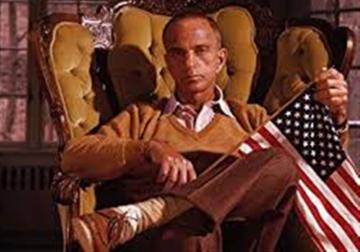"Where's My Roy Cohn' looks at master political puppeteer
“Get Me Roger Stone,” the 2017 Netflix documentary, was a piquant portrait of a pivotal political pal of Donald Trump. Now comes its unofficial prequel — or companion piece — called “Where’s My Roy Cohn?”
Cold Warrior Roy Cohn, legendary master of the dark arts of American politics, specialized in turning empty vessels into powerful demagogues. He first came to fame in 1951 during the Julius and Ethel Rosenberg treason trial, pushing hard and successfully for their execution, for which he was beloved by FBI director J. Edgar Hoover.
Soon after, Hoover recommended him to be chief counsel for Sen. Joseph McCarthy's Communist-hunting committee (1953–1954), where we see Cohn — in riveting newsreel footage — whispering questions whereby the lives of dozens of “un-American” leftists were wrecked.
On to Cohn’s association with such crime figures as Anthony “Fat Tony” Salerno and godfather John Gotti, Cardinal Francis Spellman, and the full range of Manhattan’s celebrity and power-broker circles, consumed as he was with being part of it. Extremely smart (he graduated from Columbia Law School at 20), he learned early how to manipulate and came to see himself as a top-level political puppeteer: Nancy Reagan personally thanked him for engineering John Anderson’s third-party candidacy, which assured husband Ronald’s 1980 victory over Jimmy Carter.
- Featuring: Roy Cohn, Donald Trump, Liz Smith, Roger Stone, Ken Auletta
- Rating: PG-13 for thematic content, some sexual material and violent images.
But Cohn’s greatest protégé was Donald Trump, whose father, Queens real-estate baron Fred, was bolloxed up with a major anti-black rental bias suit in 1973. Cohn got it settled without an admission of guilt and, thenceforth, became the younger Trump's own mentor, lawyer and "fixer" through the apotheosis of Trump Tower’s construction in 1983.
Oft indicted (bank fraud, perjury, stock manipulations, a yacht murder), Cohn was just as oft acquitted, with brilliant use of reporters like Barbara Walters, columnists like William F. Buckley and Liz Smith. According to Roger Stone, Cohn sometimes actually dictated his quotes to them on the phone, complete with punctuation (“comma, exclamation point!”) where he wanted it.
Says his cousin Gary Marcus: “Roy was a personality in disarray and anarchy, with no rules or boundaries” who enjoyed living on the edge because it was dangerous and exciting.
Director Matt Tyrnauer (previous documentaries include “Valentino: The Last Emperor” and “Studio 54”) makes fine use of archival materials. But it’s not necessary to inform us — more than once — that Cohn’s mother Dora was ugly or that, in rejecting middle-class Jewish values and traditions, “Roy was the very definition of a self-hating Jew.” This is a one-sided documentary to be sure. You won’t find much of a defense for the subject.
But you also won’t find much that’s defensible.
Cohn’s and McCarthy’s main attraction was the Commie business. Their less-remembered witch hunt that harmed far more people was waged against homosexuals, resulting in the firing of scores of gay men in and out of government. Final grim irony: Cohn was diagnosed with AIDS in 1984. He tried to keep his illness secret even while receiving experimental drug treatment (courtesy of President Reagan) in NIH clinical trials of AZT. He died in 1986 at 59.
The bottom line of the McCarthy-Cohn hearings (and their lives) is that, in the corruption of truth, you could substitute The Big Lie — repeated over and over until it was believed by enough people to at least sow doubt.
Roy’s Rules to live by:
1. Leave no paper trail.
2. Never admit you’re wrong.
3. Always attack, change the debate.
4. The only thing is winning. If you lose, declare victory.
It’s not in the film, but the title derives from the current president’s rage (quoted in The New York Times Jan. 4, 2018) after learning that Attorney General Jeff Sessions recused himself from the investigation into Russia’s 2016 election interference. In a furious tirade in front of many White House officials, he said he’d expected his A.G. to protect him the way (he thought) Robert Kennedy did for his brother concluding with the plaintive, “Where’s my Roy Cohn?”
It’s one of two Cohn docs this year. The other, produced by HBO, is called “Bully. Coward. Victim.” — the three words woven into Roy Cohn’s square in the NAMES Project AIDS Memorial Quilt.
(Opening Friday at the Manor Theater in Squirrel Hill.)
Post-Gazette film critic emeritus Barry Paris can be reached at parispg48@aol.com.







